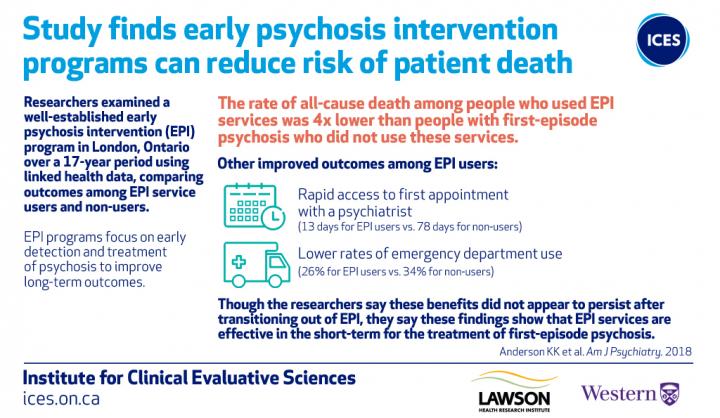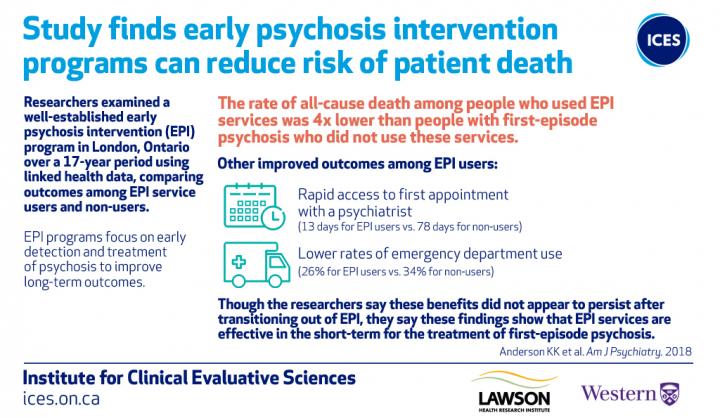
Credit: The Institute for Clinical Evaluative Sciences (ICES)
LONDON, ON – In a new study, researchers at Lawson Health Research Institute (Lawson), Western University and the Institute for Clinical Evaluative Sciences (ICES) have found that specialized programs for early psychosis can substantially reduce patient mortality.
Published online today in The American Journal of Psychiatry, the study examined health administrative data for patients treated between 1997 and 2013 at the Prevention and Early Intervention Program for Psychoses (PEPP) at London Health Sciences Centre. PEPP was founded in 1997 as the first early psychosis intervention (EPI) program in North America. EPI programs, which have been rolled out across Ontario, are specialized care models that focus on early detection of psychosis to provide intensive treatment during the first two or three years of illness.
"An episode of psychosis is characterized by delusions and hallucinations, as well as disorganized thought and behaviour patterns," explains Dr. Kelly Anderson, lead researcher on the study, a scientist at Lawson and ICES, and an Assistant Professor at Western's Schulich School of Medicine & Dentistry. "Evidence shows that early treatment of psychosis, from the first symptoms or episode, is very important in improving long-term outcomes."
The study compared early psychosis patients at PEPP against those who were not treated through an EPI program. The research team studied patient outcomes within the first two years after diagnosis. They found that patients being treated at PEPP experienced a four-fold reduction in risk of mortality, compared with people with early psychosis receiving services elsewhere.
In addition, patients at PEPP had rapid access to their first appointment with a psychiatrist and their psychiatrist visit rates were 33.2 per cent higher than the non-EPI user group. They also experienced an 8.7 per cent reduction in emergency department visits and fewer involuntary hospitalizations.
"The aim of our study was to examine the 'real-world' effectiveness of EPI programs in the context of the Ontario health care system," says Dr. Anderson. "Our results indicate a number of beneficial outcomes associated with EPI programs. Most importantly, the risk of mortality is significantly reduced."
Previous research has shown that mortality is at least 24 times higher in the first year after diagnosis of a psychotic disorder when compared to the general population. Dangerous behaviours, medical co-morbidities and suicide are all potential factors.
The study also found that patients being treated at PEPP had lower rates of primary care visits and higher hospitalization rates overall. The researchers point to a need for more collaboration with primary care providers to reduce risks of co-morbidities associated with psychotic illness and anti-psychotic medications, such as weight gain and sedentary behavior. They also point to the need for additional research to understand higher hospitalization rates.
"Hospitalizations are often a necessary therapeutic intervention for patients with psychotic illness," says co-author, Dr. Paul Kurdyak, a scientist at the Centre for Addiction and Mental Health (CAMH) and ICES. "While our study suggests that overall hospitalization rates are higher among EPI users, it also suggests involuntary hospitalization rates are lower. It may be that EPI users have better access to in-patient care and are more willing to seek care when needed."
In addition, the research team examined patient outcomes from three to five years post-admission, when patients have typically transitioned from intensive EPI services to management by their psychiatrist. Many of the benefits associated with EPI programs were not observed after three years when compared to patients who did not receive EPI services, although EPI patients were still more likely to see a psychiatrist.
"We may be seeing fewer benefits long-term for a number of reasons," adds Dr. Anderson. "While there is a reduction in intensity of EPI services at this time, there may also be improvements in individuals not treated through an EPI program due to the natural trajectory of psychotic illness. There are currently clinical trials being conducted worldwide to study whether the length of EPI programs should be extended."
Dr. Anderson hopes to expand her research beyond London to confirm the findings across the province. "We're fortunate that the Government of Ontario has invested heavily in the EPI model of care," says Dr. Anderson. "Our findings show the 'real-world' benefits of EPI programs and also suggest clues on how we can make EPI programs even more effective in the future."
###
LAWSON HEALTH RESEARCH INSTITUTE
As the research institute of London Health Sciences Centre and St. Joseph's Health Care London, and working in partnership with Western University, Lawson Health Research Institute is committed to furthering scientific knowledge to advance health care around the world.
WESTERN UNIVERSITY
Western University delivers an academic experience second to none. Since 1878, The Western Experience has combined academic excellence with life-long opportunities for intellectual, social and cultural growth in order to better serve our communities. Our research excellence expands knowledge and drives discovery with real-world application. Western attracts individuals with a broad worldview, seeking to study, influence and lead in the international community.
SCHULICH SCHOOL OF MEDICINE & DENTISTRY
The Schulich School of Medicine & Dentistry at Western University is one of Canada's preeminent medical and dental schools. Established in 1881, it was one of the founding schools of Western University and is known for being the birthplace of family medicine in Canada. For more than 130 years, the School has demonstrated a commitment to academic excellence and a passion for scientific discovery.
ABOUT THE INSTITUTE FOR CLINICAL EVALUATIVE SCIENCES (ICES)
The Institute for Clinical Evaluative Sciences (ICES) is an independent, non-profit organization that uses population-based health information to produce knowledge on a broad range of health care issues. Our unbiased evidence provides measures of health system performance, a clearer understanding of the shifting health care needs of Ontarians, and a stimulus for discussion of practical solutions to optimize scarce resources. ICES knowledge is highly regarded in Canada and abroad, and is widely used by government, hospitals, planners, and practitioners to make decisions about care delivery and to develop policy.
For more information, please contact:
Robert DeLaet
Communications & External Relations
Lawson Health Research Institute
T: 519-685-8500 ext. 75664
[email protected]
http://www.lawsonresearch.ca/news-events
Media Contact
Robert DeLaet
[email protected]
196-858-500 x75664
@lawsonresearch
https://www.lawsonresearch.com/
Original Source
https://www.lawsonresearch.ca/early-psychosis-programs-significantly-reduce-patient-mortality-study-finds http://dx.doi.org/10.1176/appi.ajp.2017.17050480





